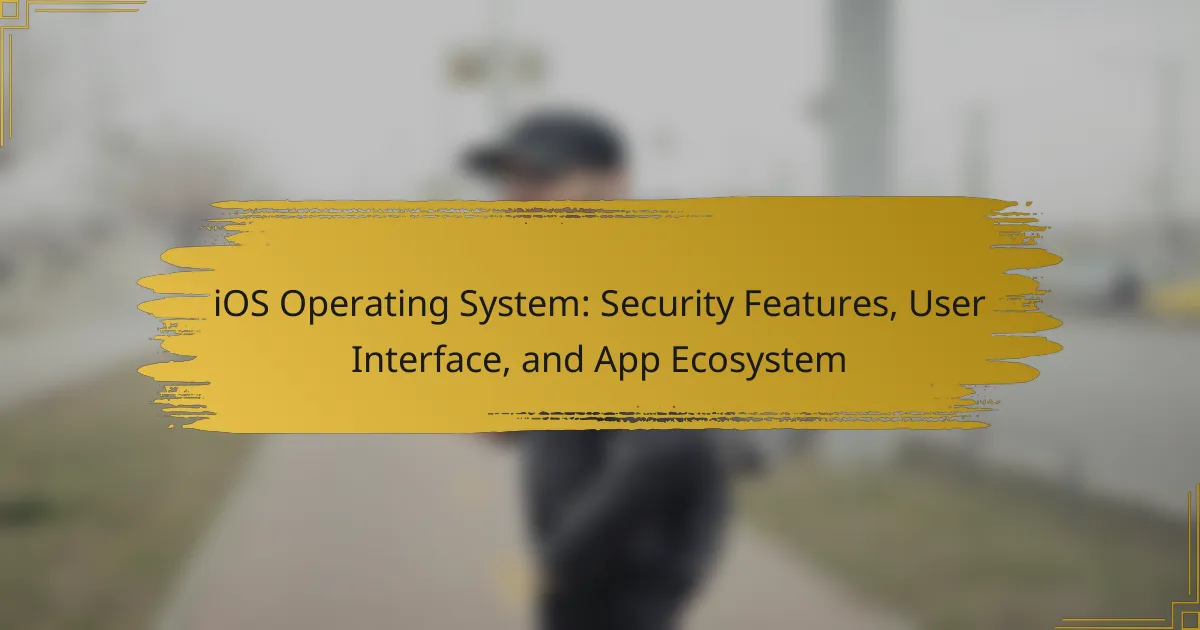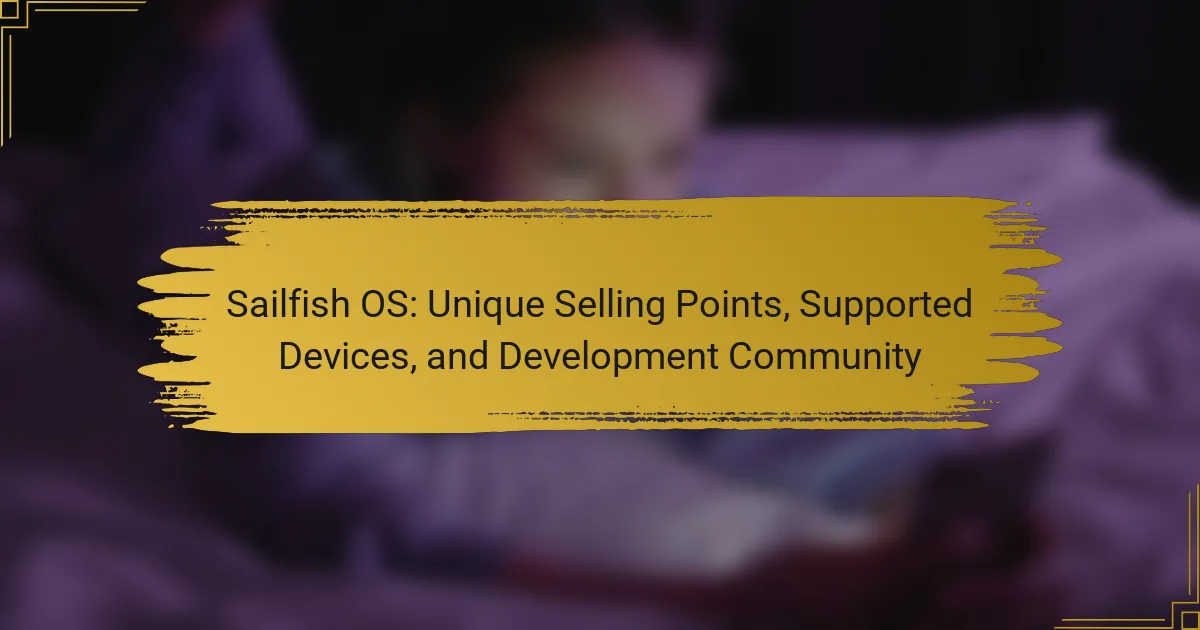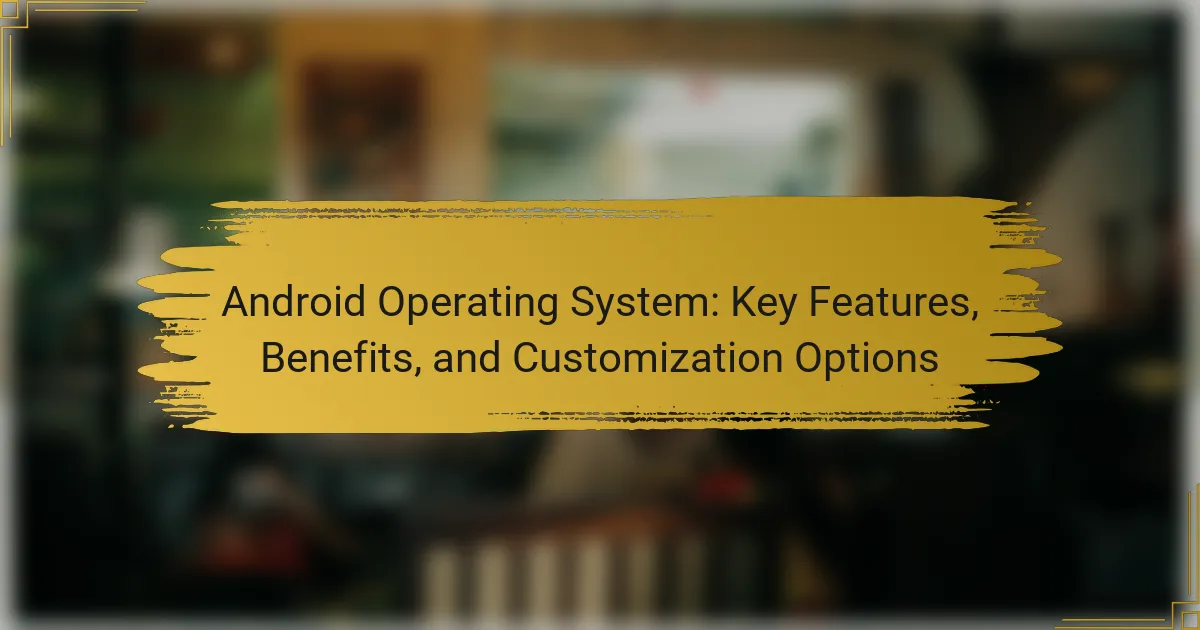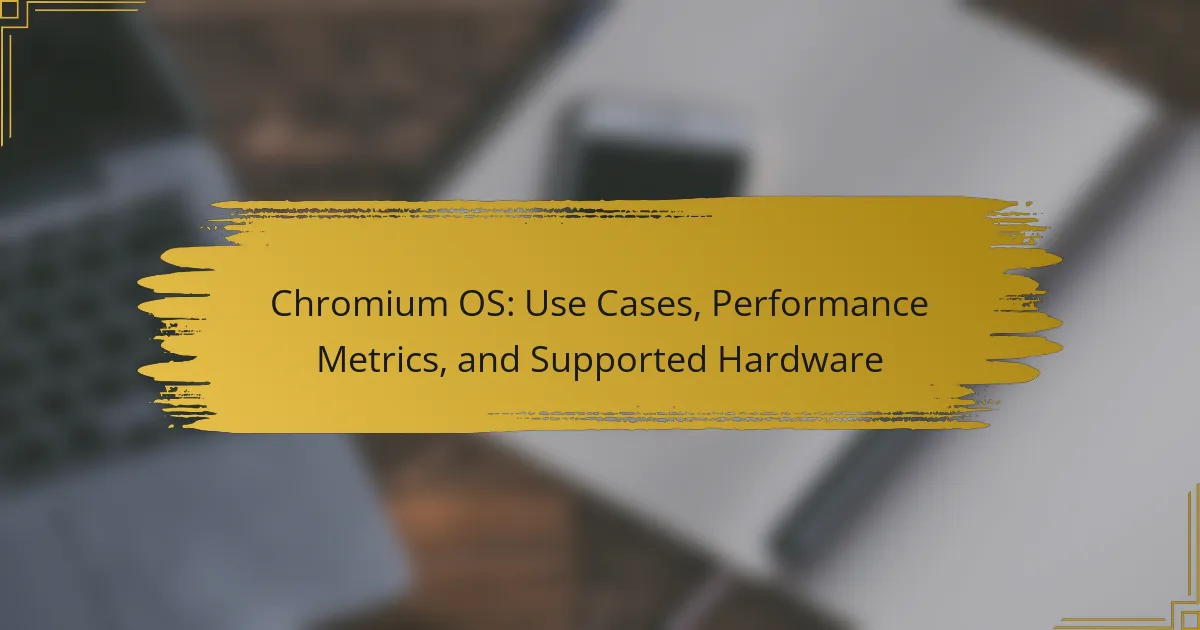Tizen OS is an open-source operating system developed by the Linux Foundation, designed for a variety of devices including smart TVs, wearables, and IoT devices. This operating system supports HTML5 and other web standards, facilitating cross-platform application development. Samsung plays a significant role in the advancement of Tizen OS, utilizing it extensively in its smart devices. The system is recognized for its lightweight design and efficient performance, allowing for seamless integration and communication between devices, ultimately enhancing the user experience. The article will explore key applications of Tizen OS, its device compatibility, and the overall user experience it provides.
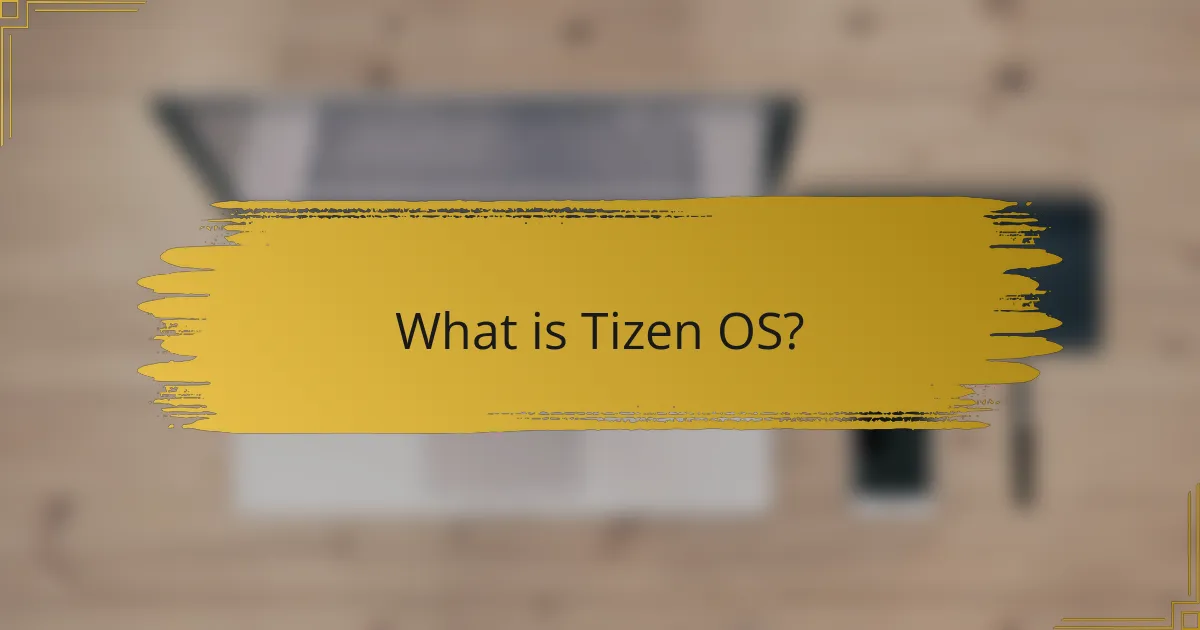
What is Tizen OS?
Tizen OS is an open-source operating system developed by the Linux Foundation. It is primarily designed for various devices, including smart TVs, wearables, and IoT devices. Tizen OS supports HTML5 and other web standards, enabling developers to create applications across different platforms. Samsung is a major contributor to Tizen OS, using it extensively in its smart devices. The system allows for seamless integration and communication between devices, enhancing user experience. Tizen OS is known for its lightweight design and efficient performance, making it suitable for devices with limited resources.
How does Tizen OS differ from other operating systems?
Tizen OS differs from other operating systems primarily through its open-source nature and adaptability. It supports multiple device categories, including wearables, smart TVs, and IoT devices. Tizen OS is built on a Linux kernel, which enhances its security and performance. It features a unique application development framework that allows for web-based apps using HTML5. This framework enables developers to create cross-platform applications more efficiently. Additionally, Tizen OS has a lightweight architecture, which allows for faster boot times and lower resource consumption compared to heavier operating systems. Its integration with Samsung’s ecosystem further distinguishes it, providing seamless connectivity with Samsung devices.
What are the foundational features of Tizen OS?
Tizen OS is a Linux-based operating system designed for various devices. Its foundational features include a modular architecture that supports a range of hardware. Tizen OS offers compatibility with HTML5 applications, enhancing cross-platform usability. It includes a rich set of APIs for developers, facilitating app creation. The operating system supports various device types, including smart TVs, wearables, and IoT devices. Tizen OS prioritizes security with a multi-layered approach to protect user data. It also features a user-friendly interface optimized for touch and remote control navigation. These features collectively enable Tizen OS to deliver a versatile and secure user experience across multiple device categories.
What are the core components of Tizen OS architecture?
The core components of Tizen OS architecture include the Linux kernel, middleware, and application framework. The Linux kernel serves as the foundation, providing essential system services. Middleware supports application development by offering APIs and services for communication and data management. The application framework facilitates the creation and execution of applications, ensuring they run smoothly on devices. Together, these components enable Tizen OS to operate efficiently across various devices, including smart TVs and wearables.
What are the key applications of Tizen OS?
Tizen OS is primarily used in smart devices, including smart TVs, wearables, and home appliances. It powers Samsung’s smart TVs, providing a user-friendly interface and access to streaming services. In wearables, Tizen OS is the operating system for Samsung Galaxy smartwatches, offering health tracking and notifications. Additionally, Tizen OS is utilized in IoT devices, enabling connectivity and smart functionalities. Its adaptability allows integration with various hardware platforms. The OS supports web applications and native apps, enhancing user experience. Tizen’s open-source nature encourages developer participation, leading to a growing app ecosystem.
How do applications enhance user experience on Tizen OS?
Applications enhance user experience on Tizen OS by providing a diverse range of functionalities and services. They enable users to customize their devices according to personal preferences. Tizen OS supports various applications, including streaming services, fitness trackers, and smart home controls. This variety caters to different user needs and interests. Applications also ensure seamless integration with other devices, enhancing overall usability. Moreover, regular updates improve application performance and security. For instance, popular apps like Samsung Health and SmartThings are optimized for Tizen, offering enhanced features. Overall, applications significantly contribute to a more engaging and personalized user experience on Tizen OS.
What types of applications are available on Tizen OS?
Tizen OS supports various types of applications. These include native applications, web applications, and hybrid applications. Native applications are built using C or C++ and provide high performance. Web applications utilize HTML5, CSS, and JavaScript for development. Hybrid applications combine elements of both native and web apps.
Additionally, Tizen OS hosts applications for smart TVs, wearables, and IoT devices. Popular categories include media streaming, fitness tracking, and smart home control. The Tizen Store offers a wide selection of apps across these categories. This diversity enhances user experience across different Tizen-enabled devices.
What devices are compatible with Tizen OS?
Tizen OS is compatible with various devices including smart TVs, wearables, and home appliances. Major manufacturers like Samsung utilize Tizen OS in their smart TVs, providing a platform for streaming and applications. Tizen OS also powers Samsung’s smartwatches, enabling fitness tracking and notifications. Additionally, home appliances such as refrigerators and washing machines from Samsung feature Tizen OS for smart connectivity. The versatility of Tizen OS allows it to integrate across multiple device types, enhancing user experience.
Which consumer electronics typically run on Tizen OS?
Tizen OS typically runs on smart TVs, wearables, and home appliances. Samsung is the primary manufacturer of devices using Tizen OS. Many of their smart TVs feature this operating system, providing access to various streaming services. Additionally, Samsung’s smartwatches utilize Tizen OS for their functionality and apps. Home appliances like refrigerators and washing machines from Samsung also incorporate Tizen OS for smart features. The integration of Tizen OS in these devices enhances user experience through seamless connectivity and intuitive interfaces.
How does Tizen OS support different device categories?
Tizen OS supports different device categories through its flexible architecture and compatibility features. It is designed to run on a variety of devices, including smart TVs, wearables, and home appliances. Tizen OS utilizes a common application framework that allows developers to create apps for multiple device types. This framework supports both native and web applications, ensuring versatility across platforms. Additionally, Tizen OS provides APIs tailored for specific device categories, enhancing functionality and user experience. For instance, smart TVs benefit from APIs that optimize video playback and streaming. Wearables utilize APIs focused on health tracking and notifications. This adaptability allows Tizen OS to maintain a cohesive ecosystem across diverse devices.
How does Tizen OS improve user experience?
Tizen OS enhances user experience through its intuitive interface and seamless integration across devices. The operating system provides a user-friendly navigation system that simplifies access to applications. Tizen OS supports multiple device types, ensuring a consistent experience on smartphones, smart TVs, and wearables. This versatility allows users to switch between devices without losing functionality. Additionally, Tizen OS offers customizable settings, enabling users to tailor their experience to individual preferences. The platform’s robust app ecosystem includes a variety of applications that cater to diverse user needs. Tizen OS also prioritizes performance optimization, resulting in faster load times and smoother operation. Overall, these features contribute to a more engaging and efficient user experience.
What user interface features are unique to Tizen OS?
Tizen OS features a unique user interface that includes a customizable home screen. Users can arrange widgets and apps according to their preferences. Another distinct feature is the Smart Hub, which provides quick access to frequently used apps and settings. Tizen OS also supports multi-window functionality, allowing users to run multiple applications simultaneously. The platform includes a unique notification center that aggregates alerts from various apps. Additionally, Tizen OS offers voice control capabilities for hands-free navigation. Its user interface is designed for both touch and remote control interactions, enhancing accessibility. These features collectively contribute to a user-friendly experience tailored for smart devices.
How does Tizen OS facilitate seamless connectivity?
Tizen OS facilitates seamless connectivity through its support for multiple communication protocols. It includes Wi-Fi, Bluetooth, and NFC for easy device pairing and data transfer. Tizen OS also integrates with IoT devices, enhancing connectivity across smart home ecosystems. The platform’s application framework allows developers to create apps that leverage these connectivity features. Additionally, Tizen OS supports web technologies, enabling remote control and monitoring of connected devices. This versatility ensures that users can interact with various devices effortlessly. The compatibility with a wide range of devices further enhances the overall user experience.
What challenges do users face with Tizen OS?
Users face several challenges with Tizen OS. One significant challenge is limited app availability. Tizen OS has fewer applications compared to competitors like Android and iOS. This limitation affects user experience and functionality. Another challenge is compatibility issues with third-party devices. Some users report difficulty connecting Tizen devices with non-Tizen products. Additionally, the user interface can be less intuitive for new users. This can lead to a steeper learning curve. Performance issues are also noted, especially on older devices. Users may experience lag or slow response times. Finally, software updates can be infrequent, leading to security concerns and outdated features. These challenges collectively impact the overall user experience with Tizen OS.
What are common issues encountered by Tizen OS users?
Common issues encountered by Tizen OS users include limited app availability, compatibility problems, and performance issues. Users often report that popular applications are not supported on Tizen. This can lead to frustration when trying to access desired content. Compatibility with various devices can also be problematic. Some users experience difficulties connecting Tizen devices with non-Tizen products. Performance issues, such as slow response times and lag, have been noted by users as well. These issues can detract from the overall user experience.
How can users troubleshoot problems on Tizen OS?
Users can troubleshoot problems on Tizen OS by following a series of systematic steps. First, they should restart the device to resolve temporary issues. Next, users can check for software updates in the settings menu. Updating Tizen OS can fix bugs and improve performance. If problems persist, users should reset the device to factory settings. This action clears all configurations and may resolve deeper system issues. Additionally, users can consult the Tizen support website for specific troubleshooting guides. This resource offers detailed solutions for common problems. Finally, users can reach out to the device manufacturer for assistance. They often have tailored support for their Tizen OS devices.
What are the future prospects for Tizen OS?
Tizen OS is expected to continue evolving in various sectors. Its integration with smart devices positions it well for growth. The increasing adoption of IoT devices supports this trajectory. Samsung, a key supporter of Tizen, will likely enhance its functionality. Recent updates have improved user experience and compatibility. The platform’s open-source nature encourages developer engagement. Partnerships with other tech firms may expand its ecosystem. Tizen’s future prospects appear promising given these developments.
How is Tizen OS evolving to meet user needs?
Tizen OS is evolving by enhancing its user interface and expanding device compatibility. The latest updates focus on improving accessibility features. These enhancements aim to provide a more intuitive experience for all users. Tizen OS is also integrating more smart home functionalities. This supports the growing demand for connected devices. Additionally, the OS is adopting AI-driven features for personalized user experiences. Recent statistics show increased adoption rates among smart TVs and wearables. This indicates that Tizen OS effectively meets diverse user needs.
What innovations can we expect in future Tizen OS updates?
Future Tizen OS updates are expected to introduce enhanced user interface improvements and better integration with smart home devices. Innovations may include expanded support for IoT applications, allowing seamless connectivity across various platforms. Additionally, updates could feature advanced security measures to protect user data and privacy. Improved performance optimizations are likely, leading to faster app loading times and reduced resource consumption. Enhanced voice assistant capabilities may also be introduced for more intuitive user interactions. These innovations align with industry trends toward smarter, more efficient operating systems.
What tips can enhance the Tizen OS experience?
To enhance the Tizen OS experience, users should regularly update their devices. Updates often include performance improvements and new features. Customizing the home screen can also improve usability. Users can rearrange apps for easier access. Utilizing the Smart Hub feature allows for quick access to frequently used applications. Additionally, exploring the Tizen Store for new apps can expand functionality. Users should also connect their devices to Wi-Fi for faster downloads and updates. Lastly, enabling battery-saving modes can prolong device usage between charges.
How can users optimize their device settings for better performance?
Users can optimize their device settings for better performance by adjusting several key configurations. First, disabling unused applications can free up system resources. Second, reducing background processes enhances overall speed. Third, updating the operating system ensures access to the latest performance improvements. Fourth, lowering screen brightness can conserve battery life and reduce strain on the processor. Fifth, enabling power-saving modes can extend device longevity and efficiency. Lastly, clearing cache regularly can improve app responsiveness. These adjustments collectively enhance the performance of devices running Tizen OS.
What best practices should users follow for app management on Tizen OS?
Users should follow several best practices for app management on Tizen OS. First, regularly update apps to ensure optimal performance and security. Tizen OS frequently releases updates that include important bug fixes and enhancements. Second, uninstall unused apps to free up storage space. This helps improve device performance and efficiency. Third, organize apps into folders for easier access. This simplifies navigation and enhances user experience. Fourth, utilize the app store to discover new applications. The Tizen Store offers a wide variety of apps tailored for the platform. Finally, monitor app permissions to protect personal data. Users should regularly review and adjust app permissions according to their privacy preferences.
Tizen OS is an open-source operating system developed by the Linux Foundation, primarily designed for smart TVs, wearables, and IoT devices. The article covers Tizen OS’s unique features, including its modular architecture, compatibility with HTML5 applications, and seamless integration with Samsung’s ecosystem. It explores key applications across various device categories, user experience enhancements, and common challenges users face, such as limited app availability and compatibility issues. Additionally, the article discusses future prospects for Tizen OS and offers tips for optimizing device performance and app management.
